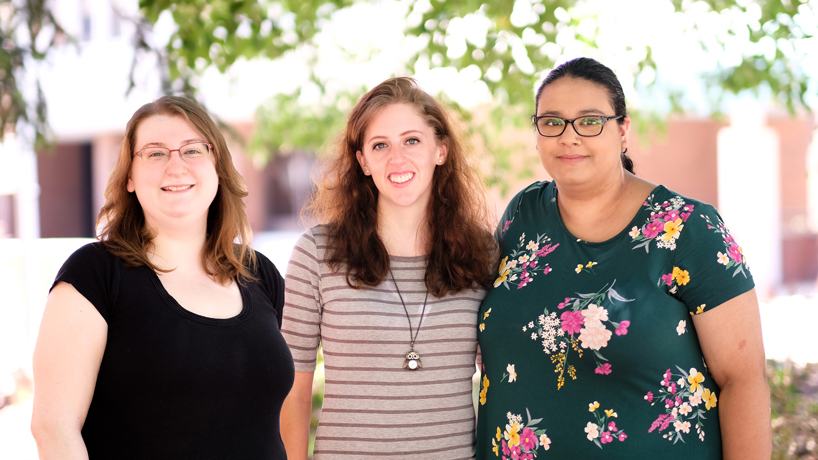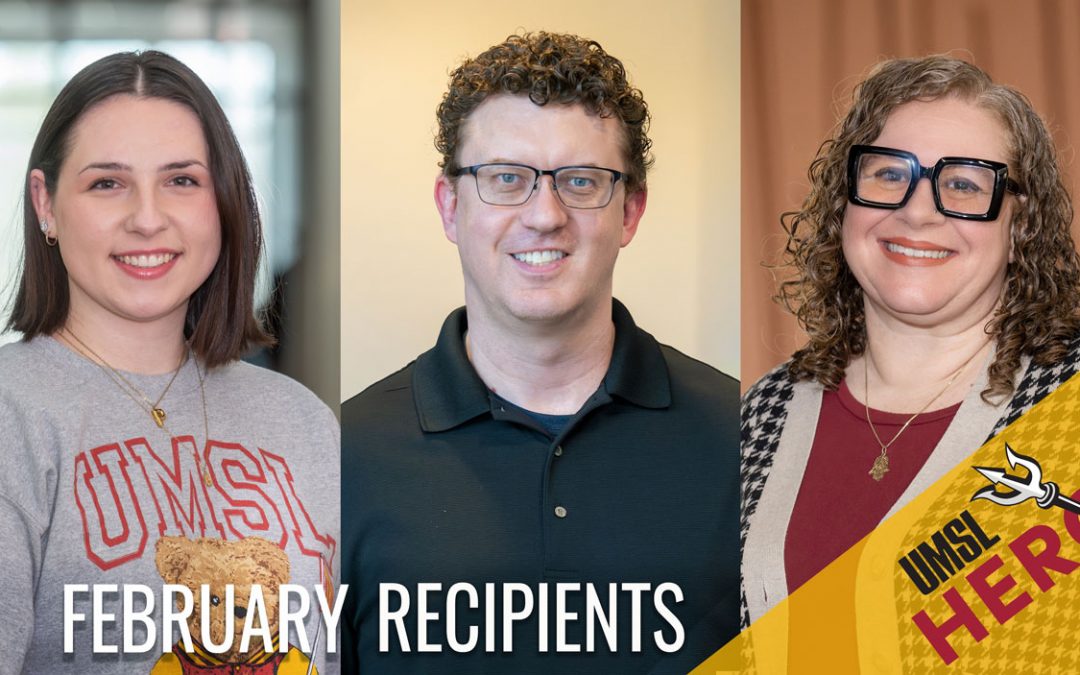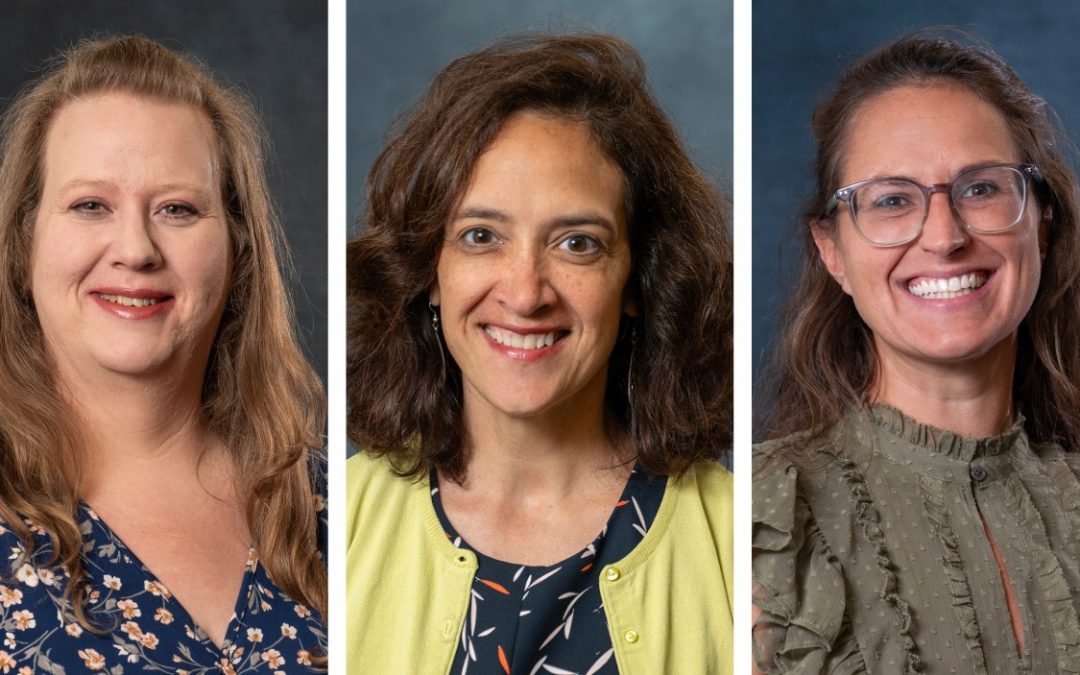
UMSL alumnae Taylor Clark (at left), Erika Sonneville and Samantha Jarnagin will spend the next year in Japan as assistant language teachers in the selective Japan Exchange and Teaching Program. (Photo composite by August Jennewein)
Erika Sonneville had every intention to attend graduate school for biology until she saw a single Facebook post.
On her newsfeed was a link to an application for an enticing program she had first heard about a few years prior. If she applied and was ultimately selected, Sonneville could spend the next year teaching in an exchange program managed by the Japanese government. She would be paid, return to a country she loved as a study abroad student and use her passion for language to inspire others.
The 2017 graduate of the biology and Japanese programs at the University of Missouri–St. Louis began to weigh her options. She was torn between the two fields of study but quickly realized that participation in the Japan Exchange and Teaching Program wasn’t a compromise but a way to blend both passions.
“It’s given me an opportunity to use both degrees in a sense,” Sonneville said. “I’ll be able to use my Japanese when I’m over in Japan for this program. And when I get back, I’ll go straight into my biology realm. That’s kind of what spurred me. I thought this was the perfect opportunity for me to be able to utilize what I have.”
Sonneville will join two other UMSL alumnae – Taylor Clark (BS 2017) and Samantha Jarnagin (BS 2018) – as an assistant language teacher. The three Japanese program graduates reported for JET Program orientation in July before heading off to their elementary, middle and high school placements across Japan.
During their yearlong contracts, which could be extended, the participants will assist Japanese teachers in foreign-language classes and serve as cultural ambassadors working toward the JET Program’s goal of internationalization.
“Textbooks are often focused on grammar, maybe slightly artificial use of language, and so the JET participants are the real communicative model,” said Amy Michael, a UMSL assistant teaching professor in Japanese and JET program alumna. “The other function as a teacher is to get Japanese students more comfortable interacting with foreigners. Their society, their school system do not have the kind of diversity that we have. It can be intimidating to interact with people who don’t look like them.
“One of the goals of the program is to get young people more comfortable interacting with people from different backgrounds. You’re kind of being this model of internationalization at the grassroots level.”
Clark, who will be based at a junior high school in Nagasaki, looks forward to the reciprocal cultural learning experience. When she applied, she had yet to travel internationally and was eager to enhance her language skills with the influence of native speakers.
“Immersion is one of those things where the more you do it, the faster you pick up on things,” she said. “I can have a conversation now and can listen pretty well, but I have to stop and think. It’s not as fluid as I would like it to be. But I think having to talk to people and do daily things like ordering food or paying for stuff at the store is really going to help with my pronunciation, how fast my speech comes and also with my ability to handle making mistakes.”
Jarnagin’s selection to the JET Program provided an opportunity to return to Japan, where she spent 11 months in Tokyo as a study abroad student from 2016 to 2017. During her experience, Jarnagin grew comfortable living in Japan, almost more so than she does in her hometown of St. Louis.
“I felt very at peace when I was over in Tokyo,” she said. “I felt like I didn’t have to worry about anything.”
She’ll now exchange her metropolitan experience in Tokyo for an island farming community. Her teaching placement is with kindergarten-age students, where she’ll provide many children with their first English-speaking experiences through songs and games.
“With language, it’s important to learn the culture as well as the language because it’s very much informed by how people act and react to situations,” Jarnagin said. “I think it’s really important to learn about people and interact with people from the country of the language you are studying because it will help you grasp things that you might not have learned before.”
Japanese language competency is not a requirement of the program but is perhaps one of the elements that made Jarnagin, Clark and Sonneville stand out among the 4,000 applications that are submitted each year. Their extensive involvement in cultural activities also played a role.
Sonneville studied abroad at Kansai University in the Osaka region of Japan and was a language tutor for other UMSL students. Clark also worked as a language tutor, was a supplemental instructor and a member of the Japanese National Honor Society. Jarnagin served as president of the Japan-America Student Association and was one of two UMSL students selected for a short-term study abroad program in 2014.
“They bring really relevant experiences – the kind of experiences this program is looking for,” Michael said. “They want people who have experience teaching in some capacity, and they also want students who are familiar with Japanese culture. The students who studied abroad can really speak to their familiarity with Japanese culture and have a proven track record of adapting to new and unfamiliar situations.”














